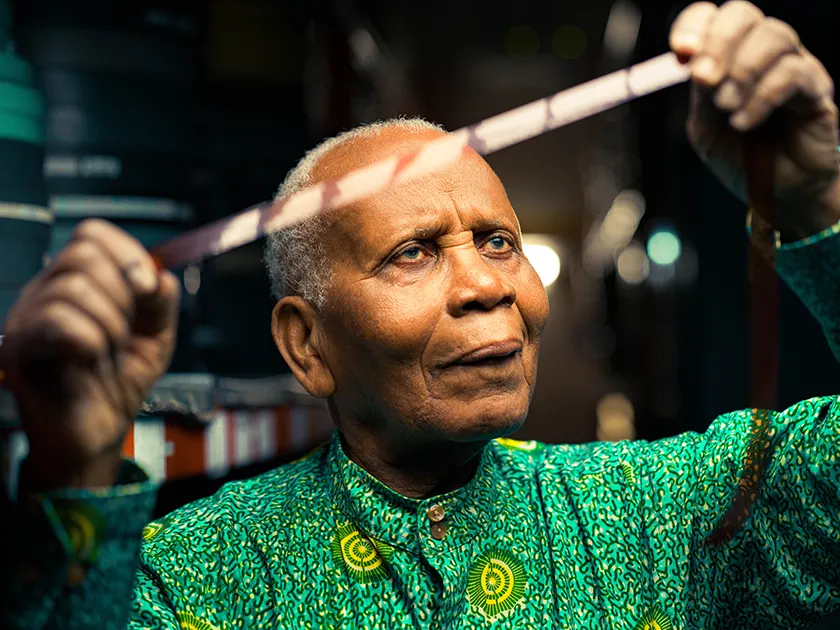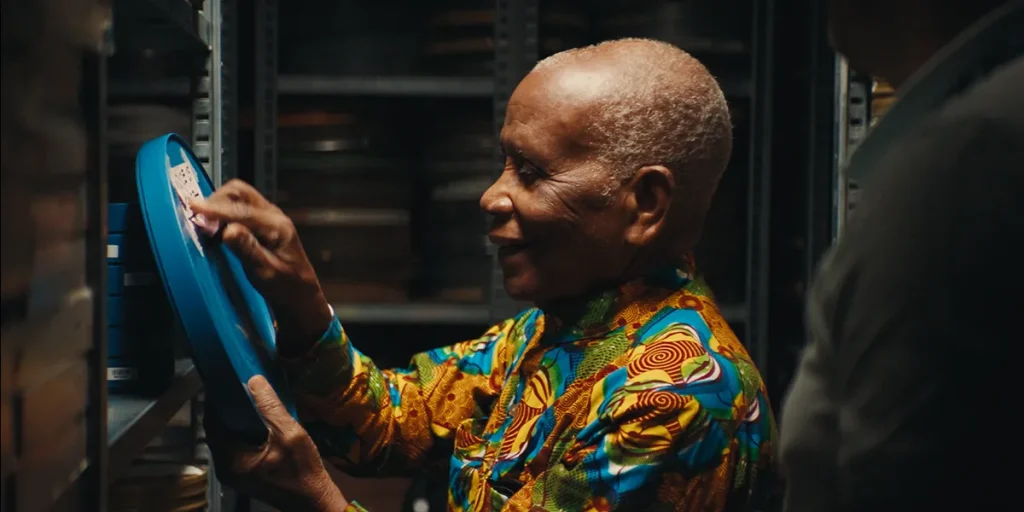Ben Proudfoot’s documentary The Eyes of Ghana is a powerful reflection on the country’s history and fight against colonialism.
Director: Ben Proudfoot
Genre: Documentary
Run Time: 90′
BFI London Film Festival Screening: October 9-10, 2025
U.S. Release Date: TBA
U.K. Release Date: TBA
“If you don’t know the story, that doesn’t mean that it never took place,” says Chris Hesse during The Eyes of Ghana. In short, that is what the documentary sets out to do: tell the audience a story that they might not know, and reclaim its rightful place in the history of Ghana and of African liberation from colonialism.
Hesse himself is a Ghanaian icon, known for being the cameraman for Kwame Nkrumah, the country’s first president, who helped Ghana gain independence in 1957 and believed in uniting all African states. After a military coup, the new regime attempted to delete every trace of Nkrumah’s political presence, including all the footage filmed by Hesse that ended up burned and destroyed.
From the very beginning of The Eyes of Ghana, the documentary takes us back to Ghana’s past to analyse the country’s history through cinema. As we explore Ghana’s struggle for liberation and postcolonial existence, the film also offers a powerful reflection on the importance of the moving image as a political medium. As both Hesse and Afonu remind us multiple times, cinema can be used as a tool to liberate Africa, as Nkrumah once hoped, and to create an identity for the Ghanian people, and African people at large, as the very movie we are seeing is trying to do.
The use of archival footage to retrace a story that would otherwise have been lost is fascinating, because the very scenes that we are seeing are the reason why Ghana’s historical past can be remembered. While most of the films had been destroyed, Hesse reveals to the audience that they are not actually gone for good, as the negatives of all his films are kept in London. With Anifa, he manages to find them and restore them to create the version we are seeing today, which is only a snippet of a much larger collection that has yet to see the light of day. The Eyes of Ghana might focus on the country’s past, but Hesse’s once-lost footage also offers a promise for its future, one that will not lose its historical memory and strive for the ideals Nkrumah once represented.

Unfortunately, having two separate narratives in The Eyes of Ghana is not always successful. On the one hand, in the present, we follow Hesse and Afonu’s journey to retrieve and restore the surviving negatives in London and their effort to reopen the local cinema. On the other hand, the past narrative, told through archival footage and Hesse’s memories, takes us through Ghana’s history and Nkrumah’s impact on the country. These two plotlines do not mix together as seamlessly or naturally as they should have, making the audience feel like they are watching two different documentaries, especially in the second half of the film.
The format of talking heads interviews intercut with archival footage can easily become repetitive, which ultimately hurts the portrayal of such a unique and fascinating subject matter. I wish that the film’s originality in its chosen topic could have matched it in visual style, but The Eyes of Ghana never steers away from the traditions of the genre or surprises us in terms of how it tells this story. The use of non-diegetic music moves away from the established genre conventions of documentary filmmaking, but not necessarily in a positive way. With its crescendo and hopeful notes, the soundtrack seems to drive and, at times, dictate our emotions too much, which inevitably feels dishonest in a documentary.
Overall, The Eyes of Ghana is a very good historical lesson, but does it work as a documentary? Unfortunately, not quite as much. Despite its interesting subject matter that many might be unfamiliar with, the film quickly becomes repetitive and uninspiring in the way it presents the information to its audience and struggles to reconcile the two narrative strands it is attempting to follow. It might still be a fascinating watch for those in the audience who are especially interested in the topics and themes it sets out to explore, particularly regarding Ghanaian history and the political power of cinema.
The Eyes of Ghana: Movie Plot & Recap
Synopsis:
Chris Hesse and Anifa Afonu join forces to depict the history of Ghanaian cinema and, through that, the history of the country.
Pros:
- The reflection on the power of cinema as a political tool is fascinating.
- The search for the lost footage and the restoration of the surviving negatives is very compelling.
Cons:
- The documentary struggles to follow two narratives that do not always mix well with each other.
- The use of non-diegetic music, especially at the end, feels out of place in this genre.
The Eyes of Ghana will be screened at the BFI London Film Festival on 9-10 October, 2025.

